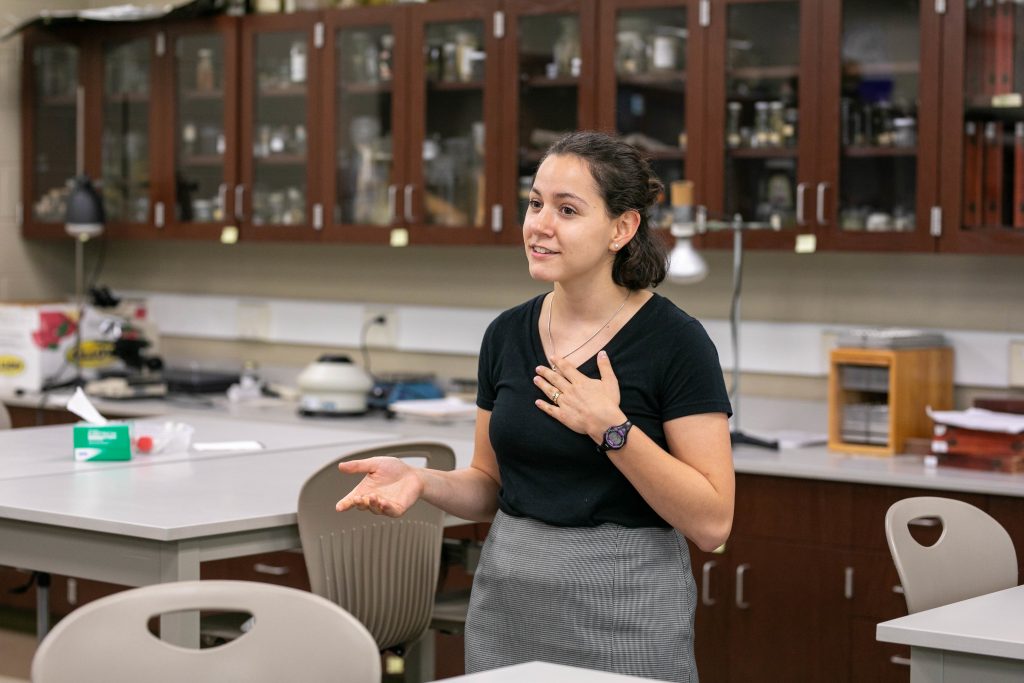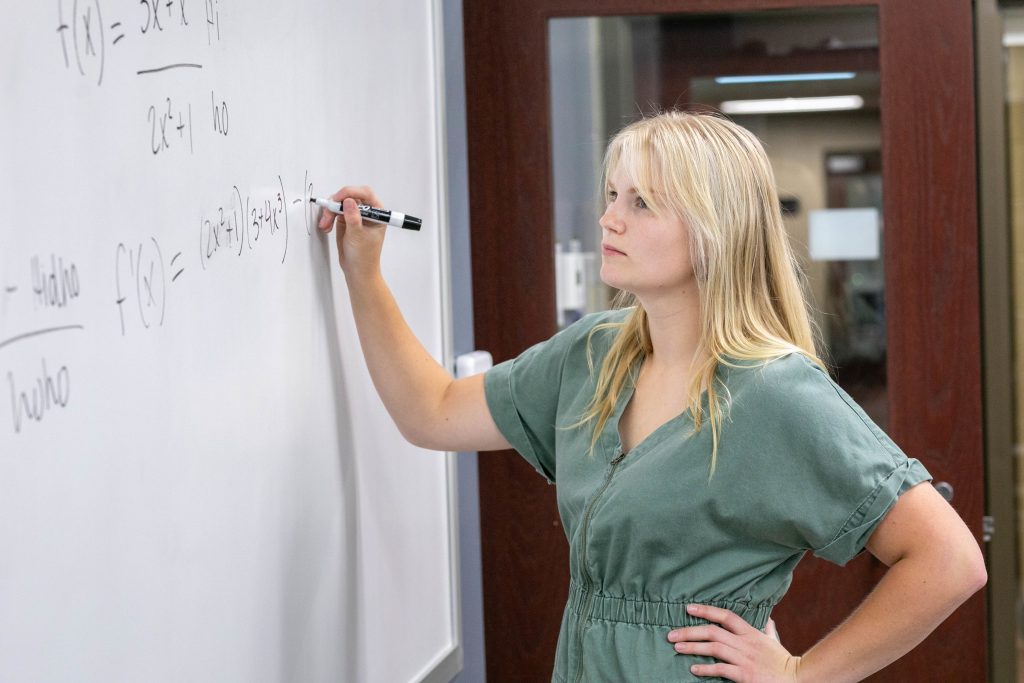Teaching science is… not only an opportunity to interact with the coming generations, but to teach students how to learn. This is particularly special in the STEM field because science educators must teach their students how, in a student’s unique way, to interact with the world, to gather understanding from it, and to later apply that understanding as they grow and experience the world outside of the classroom.
—Abby Olmstead, Noyce Scholar, class of 2023
Junior STEM education majors Morgan Evans, Christian Knight, and Abby Olmstead have been named as Noyce Scholars at Eastern Mennonite University. Each Noyce Scholar receives an annual scholarship of $10,000 or more during their junior and senior years. Once they are hired in a high-need school district, EMU will provide mentoring, professional development and support.
This is the first year of a five-year grant, funded by the National Science Foundation and Robert Noyce Teacher Scholarship Program. By 2026, 24 new STEM teachers, all graduates of EMU’s teacher education program, will have been placed in high-need school districts.
The scholarships are available to junior and senior education majors who are earning secondary teaching certifications in biology, chemistry, computer science, or math.
“This grant helps us create a pipeline to recruit and mentor STEM majors towards considering a teaching career, then helps to prepare them to teach in high-needs schools with a unique skillset of content knowledge and restorative justice practices,” said professor of teacher education Paul Yoder, the grant’s principal investigator and director of EMU’s Graduate Teacher Education program. “Once they are hired, we also will support them, all of which we hope leads towards retention of high-quality STEM teachers in our schools.”
Meet the Scholars and their inspirations to teach
It was a trip to the Bahamas to study marine biology that sealed the deal on Morgan Evan’s love of science. Other experiences, too, were fostered by Fauquier High School teacher George Murphy. Evans took biology, marine biology and AP biology courses with him and thrived on “super cool experiments” such as the study of genetics through fruit flies and managing a saltwater aquarium. “I did not realize how truly blessed I was to have this exposure to what science really is at such a young age,” she said.

Her professional goal is to create a similar atmosphere in her classroom, “an environment of inquiry where students can engage in their own thoughts about the world. Everyone does not have to go off and be a top-notch scientist, but we are all responsible for understanding the world around us so we can better treat it with respect.”
Evans says she was initially leaning towards teaching at the high school level. But now that she’s in the classroom, she has lately been thinking a lot about “how important and influential my middle school teachers were to me.” Those teachers helped her realize she was a person of worth, even when “your emotions are making you feel like your world is falling apart.”
Christian Knight remembers one elementary school teacher in his hometown of Stanley, Va., prepared to jump up on tables to get his young students’ attention. He was all about finding creative ways of teaching concepts, too, just so long as the students learned the material. Later in high school, Page County High School math teacher Brenda Nickerson “showed me teaching is about more than just teaching the subject, but also making connections to students and positively influencing them in and out of the classroom.”

Knight came to the Noyce Scholars with some prior internship experience and taste of what it’s like to be remembered as a teacher himself. As a junior, he participated in the Virginia Teachers for Tomorrow program and interned with a sixth-grade math class. “Whenever I see students I had in that class, they always wave and say, ‘Hey, Mr. Knight, do you remember me and how have you been?”
Knight plans to teach high school mathematics, and has a special passion for supporting students who don’t think they like math. He’s thinking algebra, geometry, probability and statistics and/or discrete math. His goal is “to make what a lot of students find one of the hardest subjects to be fun, enjoyable and relatable” while still teaching important fundamentals.
Olmstead took algebra II as a sophomore and AP calculus as a senior with Broadway High School math teacher Becky Harris.

“An alumnus of EMU, she takes a holistic approach to the student and their education,” Olmstead says. “She paid careful attention to the wellbeing of her students alongside their levels of academic success. She told me time and time again that I’d be a great math teacher, but I of course dismissed it every time!”
Just a few years later, Olmstead is working on fulfilling that prediction. “For me, it’s not just about numbers and derivatives and triangles–it’s about a student’s ability to believe they can. In EMU’s education program, we call it “The power of ‘yet.'” Math is a subject that is generally disliked because it’s a learning process that no one aces on their first try, and that discourages students. I want to bring this Power of Yet to the classroom and help kids understand that it’s not just applicable to math but to life in general, and there’s no demographic that needs this encouragement more than middle and high-schoolers.”
Olmstead has personal experience with the Power of Yet: in AP Calculus she enjoyed seeing all the skills developed in earlier classes of algebra, trigonometry and geometry come together. It wasn’t easy for her, but her hard work, and the encouragement of Harris, paid off with a coveted 5 on the AP test, “one of my proudest achievements from high school.”
